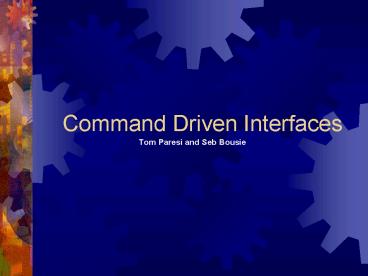Command Driven Interfaces - PowerPoint PPT Presentation
1 / 7
Title:
Command Driven Interfaces
Description:
A Command Line Interface allows a user to interact with a computer ... Complex commands can be entered to customise the operating system for a particular user. ... – PowerPoint PPT presentation
Number of Views:22
Avg rating:3.0/5.0
Title: Command Driven Interfaces
1
Command Driven Interfaces
- Tom Paresi and Seb Bousie
2
What is a Command Driven Interface?
- A Command Line Interface allows a user to
interact with a computer system by typing in
commands. - Any command which is entered must be typed in the
correct syntax to perform the operation.
Examples of a Command Driven Interfaces are Dos,
Linux and Unix.
3
Advantages
- Faster than using Menus and Icons on a GUI
interface. - Less memory required, because of no graphics on
the interface. - Works on computers with limited hardware and
software. - Experienced users can use this system faster than
others. - Complex commands can be entered to customise the
operating system for a particular user. - Does not require a Windows Operating system to
work.
4
Disadvantages
- People with limited knowledge of DOS may find the
interface confusing and hard to use. - Errors in commands can cause the operation to
fail and can be very time consuming. - Any errors in typing will require the user to
re-type command. This time consuming and
frustrating. - Commands have to be learnt, especially in UNIX
where there are hundreds. - The interface is not attractive compared to a GUI
interface.
5
Unix
UNIX is a general-purpose software, which
incorporates multi-users written in C. UNIX
unlike others is available to a wider variety of
platforms, like computers from different
manufacturers.
6
Linux
Created by Linus Torvalds, who was Finnish.
Developed by thousands of volunteers. Its free
and can be downloaded of the net. The only
biggest problem of LINUX is that it will not run
most software commonly on a windows pc.
7
- End -































